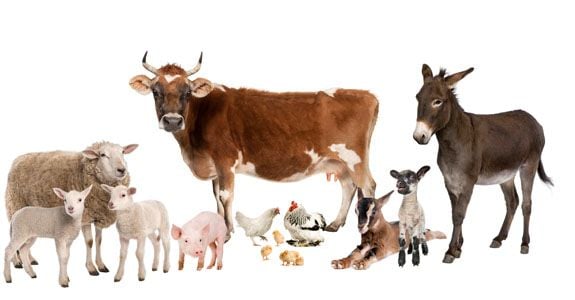Cats, unlike dogs, are true carnivores which means they thrive on meat only diets and require no vegetable, grain, or dairy supplementation. Cows milk is not recommended for cats because it can be too rich for their digestive systems. This is because most cats can't digest milk properly because it contains
Read more

Have you ever dreamed of one day owning a farm? Well, owning some livestock can give you the same rewarding feeling. Livestock consists of animals such as cows, pigs, sheep, goats, donkeys, horses, and mules. Whether you want an animal to provide you with fresh eggs in the morning or one to ride through your pasture, livestock animals are your best bet to give you what you are looking for.
Choosing what livestock to raise relies heavily on how much space you have, if they need fencing, how much they eat, state and local property laws, and more. You should also consider what type of veterinary care your livestock will require to avoid the spread of diseases and external parasites. Your veterinarian can recommend the best vaccinations for your livestock so they stay as healthy as possible. Continue to the articles below to learn how you should care for each livestock animal.
-
Do Cats Really Love Milk?
-
A Great Tool for Pet Owners
Apps for Smart Phones Of the 1.3 million apps available, at least a few are related to pets! One is the Whistle Activity Monitor which is a device that attaches to a dog's collar, and has an app to monitor the dog's daily activity. It also can chart food and medications, and can be
Read more -
Anesthesia Free Dentistry
Does your dog have stinky breath? Do your cat's teeth look brown? In fact, periodontal disease is the most common disease that pets develop. It is estimated that 80 to 85% of dogs and cats have some degree of infection. It is not just a cosmetic problem, chronic infection shortens their life because
Read more -
Camping With Your Pets
Camping is an increasingly popular activity for families and their pets. Many dogs and some cats enjoy traveling with their families. Here are a few tips to help make your pet's adventure into the great outdoors a success. Research the campground or area that you are planning on visiting. Not all
Read more -
6 Rules to Improve Your Cat's Diet
Do Not Overfeed "Obesity is the most common nutritional disease seen in cats," says Joe Bartges, DVM, PhD at the University of Tennessee's College of Veterinary Medicine. It is a common bad habit for cat owners to feed their cats too much. Cats only need 24 to 35 calories per pound of body weight each
Read more


